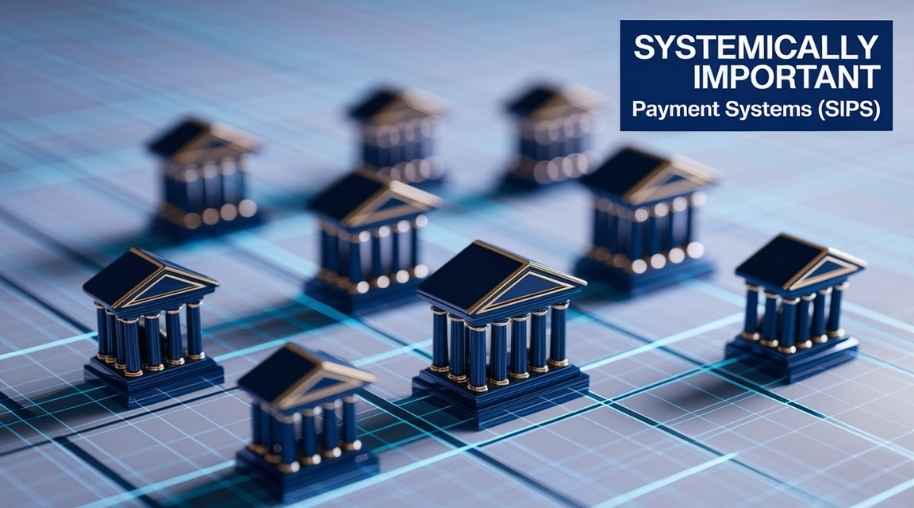SIPS Full Form-Systemically Important Payment System
by Shashi Gaherwar
0 2554
Understanding Systemically Important Payment Systems (SIPS): Role, Risks, and Regulations

Introduction
A Systemically Important Payment System (SIPS) is a critical financial infrastructure that facilitates secure and efficient fund transfers between institutions, handling large-value transactions essential for economic stability. Disruptions in SIPS could trigger systemic risks, impacting financial markets and economies. This article explores the role, risks, and regulatory measures ensuring the resilience of SIPS.
What is a Systemically Important Payment System?
A SIPS is a payment infrastructure whose failure could significantly disrupt the financial system and economy, often deemed "too big to fail." Its malfunction may lead to liquidity shortages, financial panic, or transaction breakdowns.
Characteristics of SIPS:
- High-Value Transactions: Processes large interbank payments critical for markets.
- Interconnectedness: Linked with financial institutions, clearinghouses, and central banks.
- Operational Continuity: Essential for preventing economic disruptions.
- Systemic Risk Potential: Failures could cause cascading effects across markets.
Role of SIPS in Financial Stability
SIPS are vital for economic stability and monetary transactions:
- Large-Scale Transactions: Manage interbank settlements, market transactions, and government securities.
- Liquidity Management: Enable real-time settlements, reducing credit risks.
- Monetary Policy: Support central banks in controlling money supply and interest rates.
- Payment Security: Implement measures to prevent fraud and cyber threats.
Risks Associated with SIPS
SIPS face significant risks due to their critical role:
- Systemic Risk: Failures can destabilize multiple institutions globally.
- Operational Risk: Technical issues, cyberattacks, or errors disrupt transactions.
- Liquidity Risk: Participant defaults may cause liquidity shortages.
- Legal/Compliance Risk: Regulatory breaches lead to legal and reputational damage.
Regulatory Frameworks for SIPS
Central banks and regulators enforce strict guidelines for SIPS:
- Principles for Financial Market Infrastructures (PFMI): Issued by BIS and IOSCO, ensuring robust risk management, secure settlements, and resilience.
- Central Bank Oversight: Monitors systems like Fedwire (Federal Reserve), TARGET2 (ECB), and CHAPS (Bank of England).
- Cybersecurity Regulations: Enforce measures to protect against cyber threats.
Examples of Systemically Important Payment Systems
Globally recognized SIPS include:
- Fedwire (USA): Federal Reserve’s real-time large-value transaction system.
- TARGET2 (EU): ECB’s system for Eurozone cross-border settlements.
- CHAPS (UK): Bank of England’s real-time gross settlement system.
- SWIFT (Global): Facilitates secure international financial messaging.
Future of SIPS
Advancements in FinTech are shaping SIPS:
- Blockchain and DLT: Enhance transparency and reduce intermediaries.
- Central Bank Digital Currencies (CBDCs): Enable faster, secure transactions.
- AI in Risk Management: Detect fraud and mitigate systemic risks.
Systemically Important Payment Systems (SIPS) are crucial for global financial stability, managing large-value transactions and supporting economic functions. Despite their risks, stringent regulatory oversight ensures resilience. As technology evolves, SIPS will advance to enhance security, efficiency, and stability in the financial ecosystem.
Further Learning Resources
If you’re passionate about building a successful blogging website, check out this helpful guide at Coding Tag – How to Start a Successful Blog. It offers practical steps and expert tips to kickstart your blogging journey!
For dedicated UPSC exam preparation, we highly recommend visiting www.iasmania.com. It offers well-structured resources, current affairs, and subject-wise notes tailored specifically for aspirants. Start your journey today!

Share:









Comments
Waiting for your comments